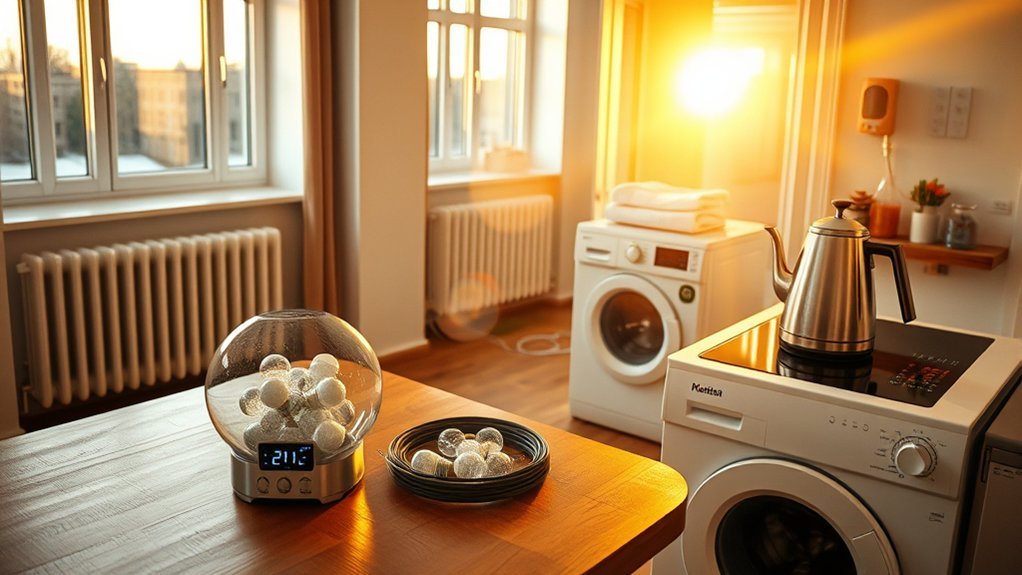Living in Lithuania is affordable compared with Western Europe — you’ll typically spend €700–€1,300 monthly as a single person depending on city and lifestyle. Rent in Vilnius city-center ranges €650–€850, utilities add €100–€150, and groceries are about €250–€350. Public transit is cheap (monthly pass ~€30), and expat tech salaries often reach €2,000–€3,000. Taxes and healthcare are reasonable, so you’ll get good value for money — keep going to see detailed costs and tips.
What Is Life Like in Lithuania?

While Lithuania blends modern infrastructure with a rich cultural scene, you’ll notice it’s especially appealing to younger people—ranked the 19th happiest country in 2024—thanks to vibrant cities and efficient public services.
You’ll find living in Lithuania compares favorably to many Western European capitals: public transit is reliable, healthcare is affordable and accessible, and free public education plus growing international school options make it family-friendly.
With an average gross salary near €1,800, your income can cover a comfortable lifestyle without extravagant spending, though lifestyle choices affect the cost of living.
Average gross pay around €1,800 lets you live comfortably in Lithuania, though personal spending choices matter.
English is widely spoken among younger residents, so you’ll integrate faster socially and professionally than in less anglophone countries.
Overall quality of life is high for expats who value safety, modern amenities, and cultural vibrancy.
If you prioritize practical infrastructure, decent wages, and straightforward access to services, Lithuania offers a balanced, cost-effective option compared with pricier European alternatives.
Monthly Living Costs Breakdown

Because your monthly costs hinge on lifestyle and location, a single person in Vilnius can expect to pay roughly €900–€1,300 a month. You’ll find the biggest variances in rent and discretionary spending: a one-bedroom apartment in the city center is typically €650–€850, while groceries run €250–€350. Basic utilities and internet add about €100–€150. Dining out is affordable — expect €12–€18 at a mid-range restaurant — so eating out regularly raises costs but won’t break the budget.
| Category | Typical Range | Notes |
|---|---|---|
| Rent (one-bedroom apartment) | €650–€850 | Center; suburbs cheaper |
| Groceries | €250–€350 | Basic staples reasonably priced |
| Utilities + Internet | €100–€150 | Seasonal heating affects total |
Compare your habits: if you cook more and limit dining out, you’ll be near €900; if you prefer dining out and amenities, budget toward €1,300.
Housing and Rent Prices Across Cities

When you compare cities, rent varies a lot — Vilnius one-bedrooms run about €650–€850 in the center and €350–€500 outside, while smaller cities are typically €300–€500.
If you’re a student, expect lower-cost shared flats or dorm options but factor in utility contributions and occasional higher deposits.
Also compare utilities and bills by location and building type, since heating, electricity and internet can add a sizable share to your monthly housing costs.
Rent by City
If you’re comparing cities, rent in Lithuania varies noticeably by location and size: in Vilnius a one‑bedroom costs about €650–€850 in the center and €350–€500 outside it, while smaller cities typically offer one‑bedrooms for €300–€500.
When you examine rent by city, you’ll see major cities drive higher living costs—Kaunas and Klaipėda sit between Vilnius and small towns.
Housing often becomes your largest monthly expense, so choose neighborhoods near public transport and amenities to balance cost and convenience. Prices fluctuate with desirability, building quality, and proximity to work or universities.
Compared with Western Europe, Lithuania’s rents are generally lower, letting you allocate more of your budget to food, transport, or savings while still living in urban areas.
Student Housing Costs
Student housing in Lithuania is noticeably cheaper than private rentals, so you’ll often save by choosing dorms or shared flats over solo one‑bedrooms.
If you pick a dormitory, student housing costs typically run €150–€250 monthly, far below Vilnius one-bedroom apartments at €650–€850.
Shared accommodation is common: splitting a flat usually costs €200–€300 per person, making central living affordable compared with private rents.
Outside Vilnius center and in smaller cities, one-bedroom apartments fall to €300–€500, so shared options still cut expenses but less dramatically.
Overall, expect student housing costs to average €200–€600 depending on city and type.
Compare dorm fees, shared accommodation, and private one-bedroom apartments to find the best value.
Utilities and Bills
Having picked your housing — dorm, shared flat, or private one‑bedroom — you’ll want to factor in utilities and other monthly bills that add to rent.
Utilities typically cost around €100–€150 per month, covering heating and internet; expect higher bills in winter. If you rent a one‑bedroom in Vilnius (€650–€850 city center, €350–€500 outside), add utilities to see total monthly outlay.
In smaller cities, one‑bedroom rents of €300–€500 plus the same utilities keep overall living expenses lower than in Western Europe.
Housing remains your largest monthly expense, so compare central versus suburban options: savings on rent often outweigh modest utility differences.
Budget accordingly so utilities and rent together fit your monthly plan.
Grocery, Dining and Food Prices

You’ll find typical grocery bills for a single person run about €250–€350 monthly, with basics like a liter of milk at ~€1 and a loaf of bread ~€1.20.
So stocking a kitchen is generally affordable compared with Western Europe.
Eating out is also reasonable—mid-range meals cost €12–€18, a pub dinner for two about €27, and local specialties like cepelinai are widely available at similar prices.
Typical Grocery Costs
Although lifestyles vary, you’ll typically spend about €250–€350 a month on groceries in Lithuania, with basics like 1 liter of milk at roughly €1 and 1 kg of tomatoes about €3.29.
You can keep grocery costs low by buying staples: bread for two for a day is about €1.33, and local markets offer seasonal produce cheaper than supermarkets.
If you cook most meals, your budget stretches further compared with eating out; a meal at a mid-range restaurant runs €12–€18, so home cooking is noticeably cheaper.
Traditional Lithuanian dishes use inexpensive ingredients, so making cepelinai or šaltibarščiai at home cuts costs.
Shop weekly, choose local brands, and compare markets to stay within the lower end of the range.
Eating Out Prices
While grocery prices stay reasonable, eating out in Lithuania gives you a clear trade-off between convenience and cost: a basic dinner for two at a neighborhood pub runs about €27, mid-range restaurant meals cost €12–€18 per person, and an Italian dinner for two can average around €38. You’ll find groceries (milk €4.67/L, apples €5.42/kg, bread for two €1.33/day) make home cooking cheaper, but eating out saves time. Compare options: casual pubs are economical, a meal at a mid-range place is predictable, and specialty restaurants cost more. Use the table below to plan:
| Type | Typical Price | Notes |
|---|---|---|
| Pub dinner (2) | €27 | Affordable casual |
| Mid-range per person | €12–€18 | mid-range restaurant |
| Italian (2) | €38 | Higher-end option |
Local Market Finds
Having covered eating-out costs, let’s look at what you’ll find in local markets and supermarkets:
A single person’s grocery bill typically runs €250–€350 a month depending on diet and shopping habits, with staples like whole milk at about €4.67/L, tomatoes €3.29/kg, and 500 g of local cheese around €3.62.
You’ll notice groceries are generally affordable compared with Western Europe; bread for two costs about €1.33 a day and many traditional dishes are cheap to prepare at home.
Dining out remains accessible—mid-range meals €12–€18 per person, pub meals for two around €27.
Expect the overall food cost around your housing and public transport expenses to shape your monthly budget for life in Lithuania.
Utilities, Internet and Household Expenses

When you budget for utilities and household essentials in Lithuania, expect basic services like heating, electricity and water to run about €100–€150 a month for an average apartment, with internet adding roughly €20–€30 depending on speed and provider. You’ll find utilities,internet,household expenses are generally lower than in many Western European countries, and staple items—like a 3L laundry detergent for about €1.57—keep recurring costs modest. If your monthly budget sits between €700–€1,200, these bills form a predictable slice.
| Category | Typical monthly cost | Note |
|---|---|---|
| Utilities (heat, water, electricity) | €100–€150 | Varies by season |
| Internet | €20–€30 | Depends on speed |
| Laundry detergent (3L) | €1.57 | Example everyday item |
| Total household slice | €120–€180+ | Part of overall budget |
You’ll save more by conserving energy and choosing competitive internet plans; overall household spending is manageable and transparent.
Transportation and Commuting Costs

If you rely on public transit, a monthly pass runs about €30 and gives you access to buses, trams and trolleybuses across cities, while single tickets cost roughly €1 — making daily commuting affordable compared with many Western European cities.
You’ll find Lithuania’s transportation system reliable and straightforward: urban public transport covers most neighborhoods and schedules are frequent enough for typical work hours.
If you drive, fuel sits around €1.60 per liter in 2025, so calculate weekly fill-ups into your budget.
Roads are well maintained and traffic congestion is minimal, so you spend less time idling and more predictable time traveling compared with congested Western capitals. That efficiency can lower overall transportation costs whether you own a car or use ride services occasionally.
In short, you’ll pay modest amounts for commuting. Choosing public transport or a mixed approach usually yields the best balance of cost, convenience and travel time in Lithuanian cities.
Salaries, Taxes and Earning Potential

Although salaries in Lithuania are lower than in many Western European countries, your earnings often go further because living costs are modest. Gross average pay is about €1,800/month, with tech roles reaching €2,500–€3,000. The minimum wage is €924 gross (~€730 net), so you can see how taxes and social contributions affect net income and spending power.
Salaries in Lithuania are lower than Western Europe, but modest living costs often stretch your earnings further.
Your typical single-person expenses range €700–€1,200 monthly, so a €2,000–€3,000 expat salary gives comfortable margins.
Consider these practical points when evaluating jobs, salaries, taxes and earning potential:
- Compare gross vs net: understand income tax and social deductions to know real take-home pay.
- Sector variation: tech and specialized roles pay noticeably more than entry-level service jobs.
- Cost-to-income fit: in smaller cities, your net goes further; in Vilnius expect higher rents but more job options.
Use local job platforms like topjobs.lt to benchmark offers and negotiate based on living costs and career growth.
Healthcare, Education and Family Expenses

Beyond pay and taxes, you’ll want to factor in healthcare, education and other family costs to judge overall affordability.
Public healthcare in Lithuania is free for residents, so routine GP visits, hospital care and many specialist services won’t hit your wallet; private clinics are affordable if you want faster access.
For education, public schools are free, and universities like Vilnius University offer English programs, which keeps higher-education costs competitive for international students.
If you’re an expat with kids, international schools exist but cost more than state schools, so compare fees against your budget.
Registration for children born to Lithuanian citizens is straightforward, reducing bureaucratic friction during family changes.
Overall family expenses for healthcare and education tend to be reasonable compared with many Western European countries, making Lithuania attractive for families.
You’ll still want to plan for private care or international school fees if you prioritize speed of service or English-language schooling.
Tips to Save Money and Stretch Your Budget

When you want to stretch your budget in Lithuania, focus on a few practical swaps that add up quickly: buy a monthly public transport pass (~€30) instead of relying on taxis, shop local markets for produce like tomatoes (~€3.29/kg) rather than pricier supermarkets, and choose mid-range restaurants (€10–€15 per meal) over high-end dining.
You’ll lower your monthly cost by comparing options and choosing affordable local services. Health care is relatively affordable too — a short private doctor visit runs about €45 — so factor that into budget planning rather than assuming high out-of-pocket fees. Limit luxury imports; they can spike spending unnecessarily.
- Use a monthly transport pass and walk or cycle for short trips to save money.
- Buy produce at markets and cook at home; fresh tomatoes and seasonal items cost less.
- Eat at mid-range places, and reserve special meals to keep dining costs manageable.
Be comparative: test alternatives, track where you spend, and prioritize affordable choices.
Frequently Asked Questions
Can a US Citizen Live in Lithuania?
Yes — you can live in Lithuania: follow visa requirements for short stays or apply for residency options (work, study, or national visa), compare costs and wages, and use English-friendly cultural integration to settle in smoothly.
Is Lithuania a Cheap Place to Live?
Yes — you’ll find Lithuania relatively cheap; cost of living is lower than Western Europe, with affordable housing options, modest daily expenses like groceries and transport, and practical savings if you prioritize smaller cities over Vilnius.
What Is the Average Rent in Lithuania?
Average rent in Lithuania is about €300–€850 monthly depending on location; you’ll see lower average housing costs in smaller cities, higher city living expenses in Vilnius, and rental market trends favor urban demand and varied amenities.
What Is a Good Salary in Lithuania?
A good salary in Lithuania is €2,000–€3,000 monthly; you’ll match above-average salaries, enjoy favorable cost comparison versus Western Europe, and access stronger job opportunities in tech and high-demand sectors if your skills align.
Conclusion
Living in Lithuania gives you good value: lower rent than Western Europe, affordable groceries, and decent public services, but lower average salaries. You’ll spend less on housing in smaller cities, more on leisure in Vilnius; you’ll save by cooking at home, use public transit, and pick shared apartments; you’ll gain health coverage through public insurance, lose some buying power vs. high‑wage countries, and find a balance between cost, comfort, and opportunity that fits your priorities.


